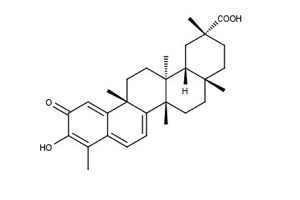Celastrol is a biologically active substance initially described in the traditional Chinese medicine. Celastrol (or (9ß,13α,14ß,20α)-3-Hydroxy-9,13-dimethyl-2-oxo-24,25,26-trinoroleana-1(10),3,5,7-tetraen-29-oic acid – CAS# 34157-83-0) is now known to be as a potent anti-oxidant and anti-inflammatory small molecule.
Celastrol interacts with the NFκB pathway and inhibits proteasome activity. Celastrol is able to induce heat shock response and cytoprotection in various cells. (1 -3)
Recently, Zhao et al. have shown that Celastrol may be used as a NF-kB inhibitor to inhibit Multiple Myeloma proliferation by down-regulating anti-apoptotic proteins (bcl-2, survivin…). They also demonstrate that Celastrol’s effect on the Nk-B pathway is Heme Oxygnase-1 (HO-1) independant. (4)
Sources:
1- Sethi et al. “Celastrol, a novel triterpene, potentiates TNF-induced apoptosis and suppresses invasion of tumor cells by inhibiting NF-kappaC-regulated gene products and TAK1-mediated NF-kappaB activation” (2007) Blood, 109 2727.
2- Westerheide et al. “Celastrols as inducers of the heat shock response and cytoprotection” (2004) J. Biol. Chem., 279 56053.
3- Yang et al. “Celastrol, a triterpene extracted from the Chinese “Thunder of God Vine” is a potent proteasome inhibitor and suppresses human prostate cancer cell growth in nude mice” (2006) Cancer Res., 66 4758.
4- Zhao et al. (2014) “NF-Kappa B Modulation Is Involved in Celastrol Induced Human Multiple Myeloma Cell Apoptosis” (2014) PLoS ONE22 April,DOI://dx.doi.org/10.1371/journal.pone.0095846.



